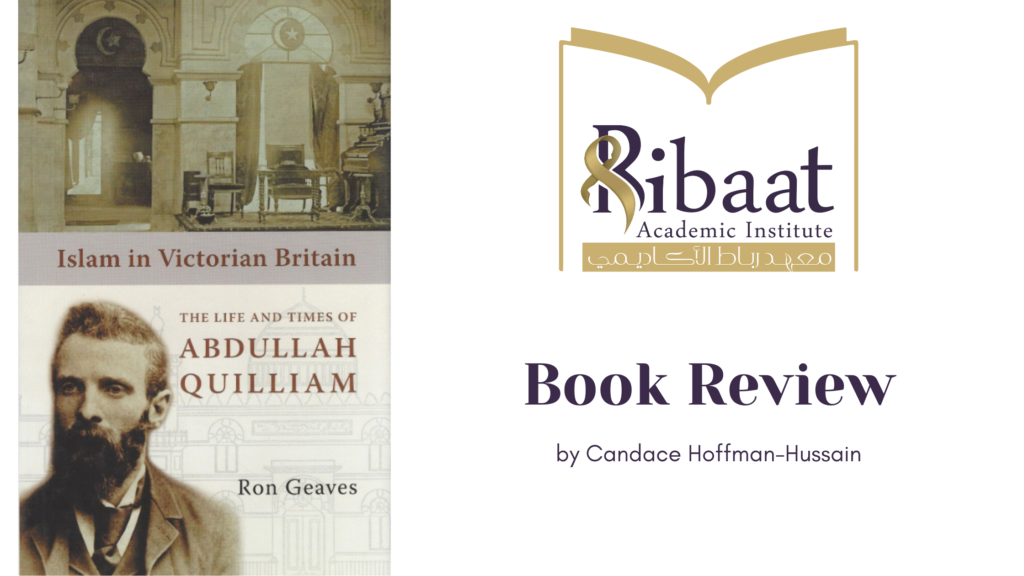Geaves, Ron. Islam in Victorian Britain: The Life and Times of Abdullah Quilliam. Markfield, Leicestershire, Kube Publishing, 2010.
Ron Geaves is a British scholar of religious studies who has written over a dozen books, mostly focusing on Islam in relation to Western society, including Britain. Published in the UK in 2010, Islam in Victorian Britain: The Life and Times of Abdullah Quilliam, offers a detailed account of Quilliam, an English Muslim convert who established an Islamic cultural centre in Liverpool, England during the Victorian era.
Quiliam (born William H. Quilliam) was a devout non-Conformist Christian, who after visiting Morocco in 1887 was inspired to convert to Islam. He established a Liverpool Muslim Institute and British Muslim Institute in September 1887, which contributed to more than 500 British people accepting Islam. He was a famous solicitor who came from a wealthy family with ties to the Isle of Man and Liverpool. He had experience writing for local and national publications as a journalist, which was later of great help when he was later a Muslim leader and critic of Christian culture including through his writings for his two publications, the weekly The Crescent and monthly Islamic World, along with his public lectures. Quilliam strongly believed in social justice principles, was an ally to abolitionists, and voiced his opposition to capital punishment, giving support to trade unions and supporting the disadvantaged including orphans. He was also raised within the Temperance movement so did not drink alcohol even before his conversion to Islam. Quilliam was inspired to not just open a place for Muslims to worship and hold lectures that were open to the general public, but also an institution that educated children took care of orphans, and helped feed the local poor.
Abdullah Quilliam was a huge supporter of the Turkish Caliphate, which contributed to some of the conflicting loyalties he had as both a British citizen and a follower of Islam. Throughout his time as a community leader in England, Quilliam and his community dealt with Islamophobia before it was even a word as we know it in current times. English people opposed to the presence of Muslims worshipping and performing their religious rites, performed acts of vandalism such as breaking windows of the institute or acts of intimidation including heckling at Islamic events. Quilliam would sometimes respond to this behavior with calls for the community to attend lectures at the institute. Furthermore, the Muslim community enacted an annual ritual of feeding many poor locals, including on Christmas. Unfortunately, the institute did not survive long after he abruptly went abroad with a son in 1908 following a legal controversy. He passed away in 1932, during the later period in which he went by the identity of Henri de Leon (1908-1932).
I thoroughly enjoyed this book. I have something in common with Quilliam because we both were influenced by Unitarian principles before converting to Islam. While I lived in the UK, I spent about a year attending a Unitarian church in Kendal, in the Lake District in England, which provided a great contrast to my Catholic upbringing. Additionally, I heard Ron Geaves speak about the book at an academic conference that I attended regarding Islam within Britain. I was struck by how Quilliam encouraged the integration of Islam within Victorian Britain. For example, he stressed that it was perfectly acceptable for English converts to continue to wear their typical fashions of the time during their daily lives. Despite living a century before any access to the internet, he was still able to connect with other Muslims throughout the world to the extent that he was named Sheik al-Islam of the British Isles. Geaves asserts (p.17), “I am certain that the only man to hold the position of Sheikh al-Islam of the British isles would be thrilled to know that there are around two million Muslims in Britain today, and possibly over a thousand mosques”.
I strongly recommend this book to anyone with an interest in the history of Islam, especially within Western societies or Muslim converts. Islam in Victorian Britain provides a great insight into how Muslims were already starting to become part of a multicultural area within England as early as the end of the 19th century. Liverpool was a fascinating area of the time due to its seaports and Quilliam had the gift of connecting with Muslims within England and throughout various places within the world through his upper-class connections, journalism, and his skills as a well-known solicitor. I believe that both non-Muslim and Muslim readers in the West could benefit from learning about this very important figure of British history who grappled as a British-born citizen with his loyalty to both country and his converted faith of Islam.
Learn more about Ribaat Academic Institute at ribaat.rabata.org.



